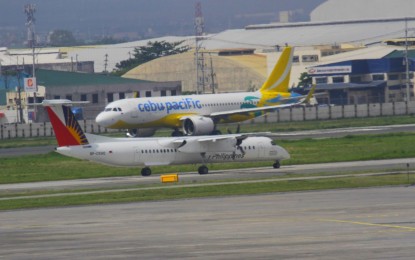
Passenger planes at NAIA (File photo)
MANILA – The Inter-Agency Task Force for the Management of Emerging Infectious Diseases (IATF-EID) has adopted the guidelines issued by the International Civil Aviation Organization (ICAO) for inbound flight crew, Malacañang said on Friday.
In a press statement, Presidential Spokesperson Harry Roque, who also serves as IATF-EID spokesperson, said the IATF-EID’s latest decision was contained in Resolution 53.
Under the resolution, the Department of Transportation and its attached agencies such as the Civil Aeronautics Board and the Civil Aviation Authority of the Philippines are directed to issue the necessary guidelines.
The guidelines should also specify that “inbound flight crew must remain in their accommodation establishments upon arrival to avoid transmission,” according to the resolution.
ICAO, through the Council Aviation Recovery Task (CART) Force, has guided governments and industry operations to restart the international air transport sector affected by the impacts of Covid-19 pandemic.
ICAO, in one of the modules included in the CART Take-off guidance, provides harmonized health protection and sanitation considerations applicable to flight crew throughout the world.
The considerations include a restriction on possible access to the flight deck, reduction of people's interactions with cabin crew, and the removal of flight crew members displaying Covid-19 symptoms from the flight deck.
On July 6, the Philippine government allowed the non-essential travels abroad amid the Covid-19 outbreak.
The travel restrictions were lifted as the government seeks to gradually reopen the economy.
ICAO noted that airports have seen a 28.4-percent decline in global passenger traffic volumes for the first quarter of 2020, which is equivalent to a reduction of 612 million passengers.
It also estimated that by the end of 2020, the Covid-19 impact on scheduled international passenger traffic could reach reductions of up to 71 percent of seat capacity and up to 1.5 billion passengers globally. (PNA)
